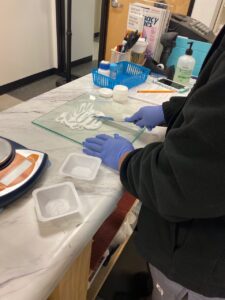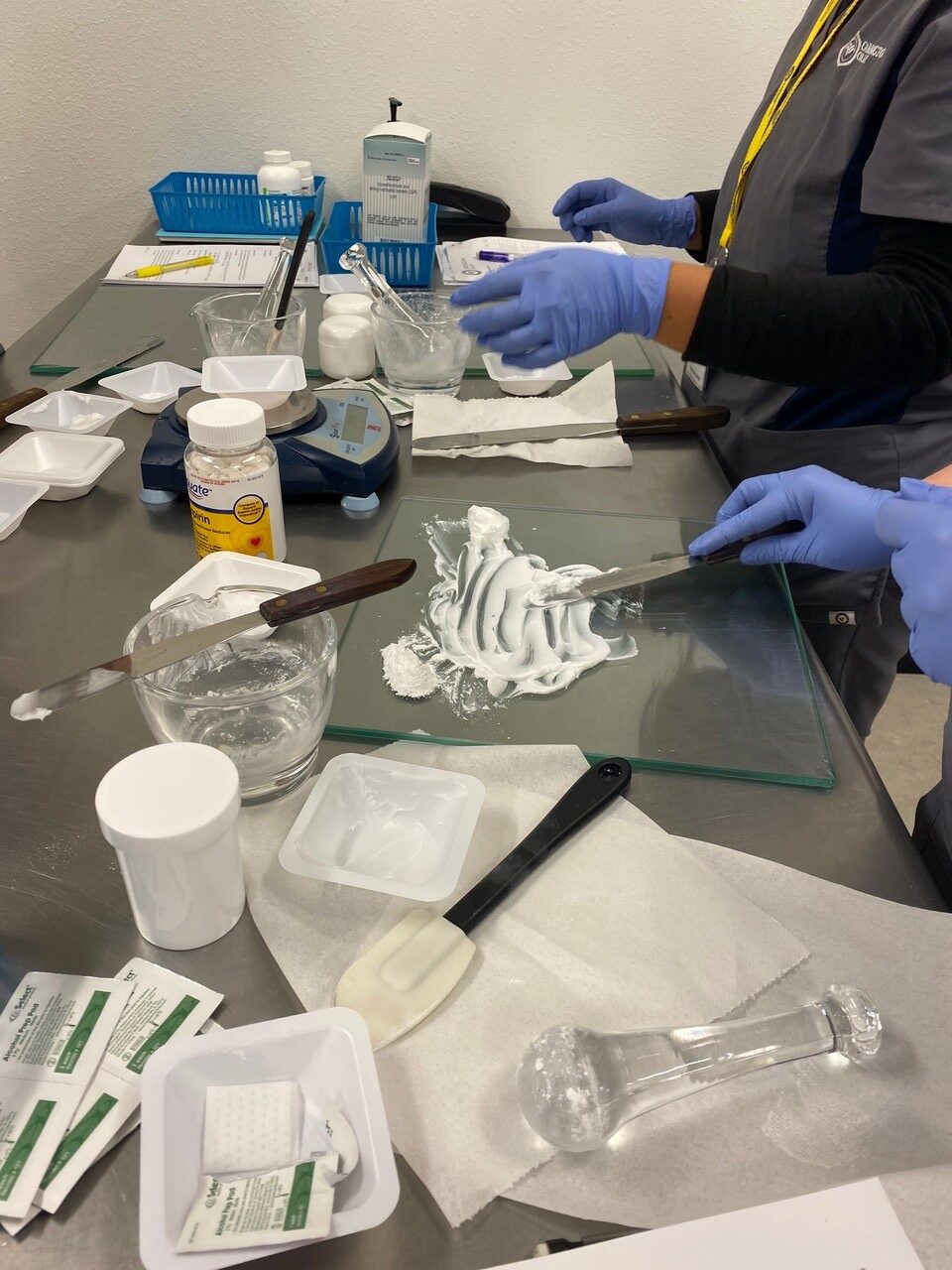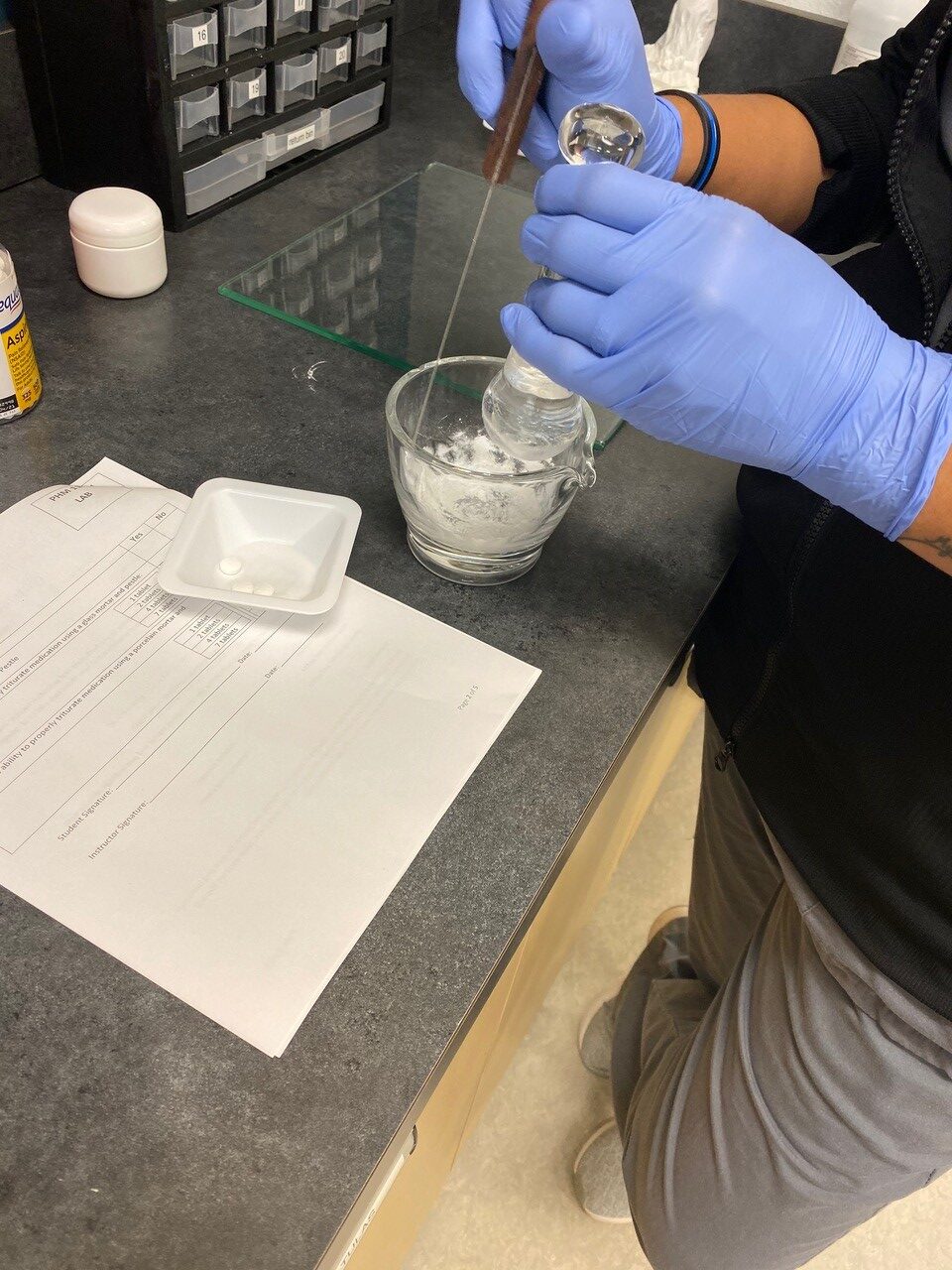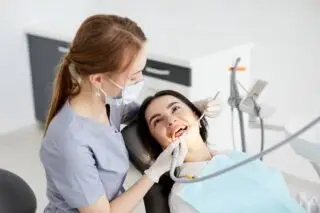
Just like every human being is unique, so is every patient with their own distinct medical needs and preferences. This means that sometimes the prescription medication they require falls outside what is mass-produced and readily available in pharmacies. Thankfully, prescription compounding allows for creating individualized medications to meet a patient’s specific needs and treatment plan. Compounded medications are custom-made by Pharmacy Technicians (PT) who use their skills to weigh, grind, mix, mold, and encapsulate prescriptions according to doctors’ specific orders. Through the pharmacy technician program at Carrington College, PTs learn the skills to prepare for this exciting and important aspect of their career.
Compounding is used for creating pharmaceuticals to treat diseases and conditions that are addressed by many different areas of medicine, including a wide variety of specialties. Some of the most common physicians to prescribe compounded drugs are pediatricians, dermatologists, pain specialists, endocrinologists, gastroenterologists, podiatrists, oncologists, and pain specialists.

With pediatric medicine, it is often difficult for children to swallow large tablets or syrups that taste yucky to them. Or, to their parent’s great frustration, they may just be resistant to taking medication altogether. PTs can use their compounding skills to transform medication into items like gummy bears, lollipops, and hard candy that children will find much more pleasant to taste. That simple change will make treatment more successful for the child, and life a lot easier for their parents.
Children aren’t the only ones who have difficulty with taking medications. Some adults and seniors find it challenging to swallow pills due to various health conditions. Grinding drugs down to powder form and putting them into a cream or gel that can be applied topically and absorbed through the skin transdermally may be a better option. Other patients with swallowing difficulties may need a chewable or lozenge style medication. Then there are rectal suppositories that work to slowly release medication. Suppositories have distinct benefits due to the fact that they bypass the upper gastrointestinal tract, retain more of their potency, and eliminate highly undesirable side effects like nausea and vomiting while being absorbed directly into the bloodstream via a mucus membrane. Likewise, women suffering from reproductive health complaints may benefit from vaginal suppositories that release medication locally via the mucus membrane of the vagina. No matter what the delivery method, the ultimate goal of compounding is delivering medication in a form that patients can fully utilize with minimal side effects while optimizing their treatment.
Allergies and sensitivities are also issues for patients. Mass-produced prescription drugs commonly have small amounts of dyes and fillers or caffeine in them that a small portion of patients can’t tolerate. Some also may have a moral issue with consuming an animal-derived collagen product like gelatin, which is used to make capsules, tablets, syrups, and other pharmaceuticals—they want all-vegan medications. Custom medications that exclude all of these allergic, aggravating, or undesirable ingredients are entirely possible through compounding. Compounding also allows PTs to create custom dosages. So, is it an issue when a patient walks in with a prescription for ninety 750mg ibuprofen pills when ibuprofen tablets only come in 100, 200, 400, 600, and 800mg form? Not when there is a PT at the pharmacy with compounding knowledge and abilities!
We can’t forget about our animal friends when we discuss compounding. They are one of the key patient populations. Anyone who has tried to administer medication to a pet knows how daunting a task it can be when they are resistant to taking it. Through compounding, tasty flavors can be incorporated into medications that help encourage pets to comply with taking them. Creams and lotions can also be created for topical application.
Carrington prepares its future PTs for compounding through a variety of means, including in-class labs, take-home kits, and a compounding fair where students share products that they have created with attendees and the media. Last year’s students shared their charcoal body wash and beeswax lip balm that they compounded, packaged, and labeled. PT students learn about a variety of preparation methods and techniques, as well as viscosity, powders, emollient bases, density, flavoring, medicated creams, encapsulation, label making, and preparing syringes and IV bags to name just a few subjects.  Compounding skills are needed and applied wherever PTs are employed. This includes is not exhaustive, but it includes everywhere from retail and privately-owned pharmacies to county jails and federal prisons to the FDA and United States Army. Today there are online pharmacies, which may be allopathic, naturopathic, or a mixture of the two. Then we have hospice and residential homecare pharmacies that are often located where patients reside. PTs may also find employment in hospitals where they compound infusions for patients from departments like oncology, rheumatology, and neurology. Then there are radiopharmaceuticals, which include radioactive isotopes and are most often used to treat cancer. These drugs must be created in what is called a “hot lab” by PTs with advanced training. At long last, we come back to our animal friends. There are many veterinary pharmacies both on and off the Internet for those who want to focus on them. If a PT is especially passionate about compounding, they can even go back to school to become a compounding pharmacist.
Compounding skills are needed and applied wherever PTs are employed. This includes is not exhaustive, but it includes everywhere from retail and privately-owned pharmacies to county jails and federal prisons to the FDA and United States Army. Today there are online pharmacies, which may be allopathic, naturopathic, or a mixture of the two. Then we have hospice and residential homecare pharmacies that are often located where patients reside. PTs may also find employment in hospitals where they compound infusions for patients from departments like oncology, rheumatology, and neurology. Then there are radiopharmaceuticals, which include radioactive isotopes and are most often used to treat cancer. These drugs must be created in what is called a “hot lab” by PTs with advanced training. At long last, we come back to our animal friends. There are many veterinary pharmacies both on and off the Internet for those who want to focus on them. If a PT is especially passionate about compounding, they can even go back to school to become a compounding pharmacist.
It could be said that compounding is the creative side of pharmacy technology. Even so, measurements need to be exact and the compounding process itself has to be rigorously executed to meet scientific standards for patient safety and success. The Pharmacy Technology program at Carrington, with its hands-on learning and accessible teachers, equips students with the diverse education and confidence they need to succeed in this exciting aspect of their careers.



